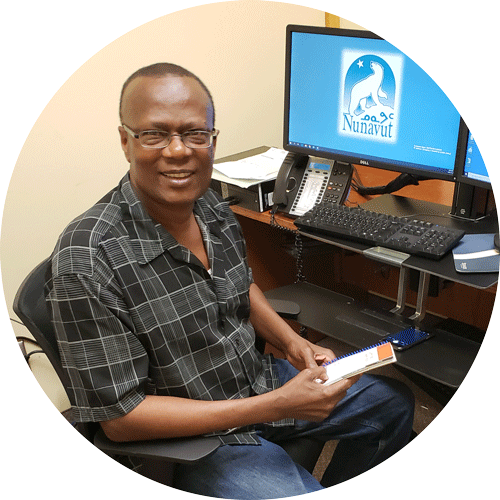The frightening howl of the Arctic winter wind caused Wilfred Ntiamoah to get his Master of Public Health at the University of Waterloo eight years ago.
 Today, Ntiamoah (MPH ’12) is the director of population health in the Qikiqtaaluk region of Nunavut (also known as the Baffin region), where he is responsible for the implementation of public health programs in 11 communities spread across a vast, sparsely populated landscape.
Today, Ntiamoah (MPH ’12) is the director of population health in the Qikiqtaaluk region of Nunavut (also known as the Baffin region), where he is responsible for the implementation of public health programs in 11 communities spread across a vast, sparsely populated landscape.
He and his team of about 20 people travel extensively, reaching out to people in the communities of Pond Inlet, Igloolik, Arctic Bay, Hall Beach, Resolute Bay, Grise Fiord, Pangnirtung, Cape Dorset, Clyde River, Qikiqtarjuaq and Kimmirut.
They offer programs in nutrition and healthy eating, food security, help with chronic illnesses such as diabetes, as well as environmental issues like water quality, mould and more. They help people quit smoking, help prevent rabies in dogs and help the communities get funding for a whole array of programs that make a big difference in the everyday lives of people in Canada’s most remote places.
Needless to say, Ntiamoah has become more used to the Arctic wind over the years, but it was a bit of shock in 2008 when the native of Ghana, West Africa, who had previously lived in places like Toronto and Edmonton, arrived in the western part of Nunavut in his role as an environmental health officer based in the tiny hamlet of Kugluktuk.
“My children and my wife were in Edmonton and I was lonely; I felt like I was at boarding school,” he says. “I had no Wi-Fi. Even the internet was still a big deal in Nunavut at that time.” He arrived in the month of November, in the throes of the Arctic winter. “It gets so cold and the wind can frighten you. It's scary.”
Friends in Ottawa encouraged him to pursue a Master of Public Health (MPH), both to help his career and also to have something to do when he got home at night. He already had an environmental health degree from Ryerson, obtained in the 1980s after he arrived in Canada from Ghana. A Master of Public Health was not offered in many places in Canada, so he was thrilled when he discovered that Waterloo had an MPH program and that he could take the courses remotely while working in Nunavut. Then, last year, he completed a graduate diploma in food safety and quality assurance at Guelph.
Today, the programs his office provides are having a huge impact on the health of communities in the Qikiqtaaluk (Baffin) region. The programs include pre-natal nutrition, food safety courses to help reduce food-borne illnesses and tobacco cessation programs to help people in the region quit smoking. There is even a dog vaccination program because dogs are an important part of northern community life and by vaccinating the dogs, it helps prevent rabies.
“I have never heard of a case of human rabies here in Nunavut because our programs are very effective,” Ntiamoah says.
Ntiamoah says without the MPH degree, he probably wouldn’t be in the role he has now. The courses he took were not just about public health, but also administration and management. Those aspects of the degree are critical to Ntiamoah’s current leadership role. The courses also dealt with socio-economic issues, which are extremely important in building healthy communities in the north, he adds.
Ntiamoah keeps in touch with some of his professors at Waterloo who have been mentors for him in his career. He tries to encourage integrating knowledge about northern communities in the courses because he says the issues in Canada’s north affect the south and vice-versa. Meanwhile, the feedback from people in the Nunavut communities in his region has been extremely gratifying, Ntiamoah says.
“We get calls from people we have helped who say thank you. It really makes us feel that we are doing something useful for society.”






